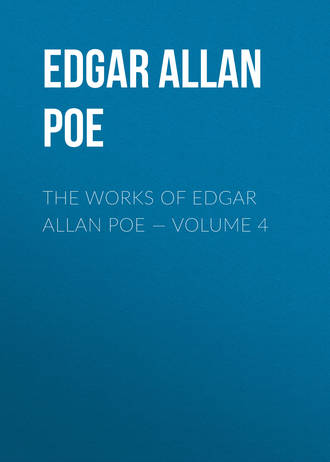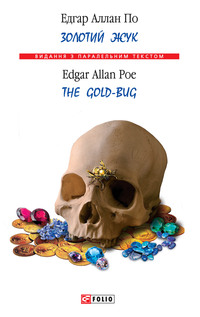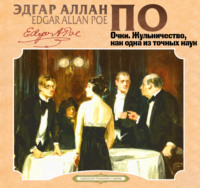 полная версия
полная версияThe Works of Edgar Allan Poe — Volume 4
April 4. — The new gas is doing wonders, in conjunction with the new improvement with gutta percha. How very safe, commodious, manageable, and in every respect convenient are our modern balloons! Here is an immense one approaching us at the rate of at least a hundred and fifty miles an hour. It seems to be crowded with people — perhaps there are three or four hundred passengers — and yet it soars to an elevation of nearly a mile, looking down upon poor us with sovereign contempt. Still a hundred or even two hundred miles an hour is slow travelling after all. Do you remember our flight on the railroad across the Kanadaw continent? — fully three hundred miles the hour — that was travelling. Nothing to be seen though — nothing to be done but flirt, feast and dance in the magnificent saloons. Do you remember what an odd sensation was experienced when, by chance, we caught a glimpse of external objects while the cars were in full flight? Every thing seemed unique — in one mass. For my part, I cannot say but that I preferred the travelling by the slow train of a hundred miles the hour. Here we were permitted to have glass windows — even to have them open — and something like a distinct view of the country was attainable... Pundit says that the route for the great Kanadaw railroad must have been in some measure marked out about nine hundred years ago! In fact, he goes so far as to assert that actual traces of a road are still discernible — traces referable to a period quite as remote as that mentioned. The track, it appears was double only; ours, you know, has twelve paths; and three or four new ones are in preparation. The ancient rails were very slight, and placed so close together as to be, according to modern notions, quite frivolous, if not dangerous in the extreme. The present width of track — fifty feet — is considered, indeed, scarcely secure enough. For my part, I make no doubt that a track of some sort must have existed in very remote times, as Pundit asserts; for nothing can be clearer, to my mind, than that, at some period — not less than seven centuries ago, certainly — the Northern and Southern Kanadaw continents were united; the Kanawdians, then, would have been driven, by necessity, to a great railroad across the continent.
April 5. — I am almost devoured by ennui. Pundit is the only conversible person on board; and he, poor soul! can speak of nothing but antiquities. He has been occupied all the day in the attempt to convince me that the ancient Amriccans governed themselves! — did ever anybody hear of such an absurdity? — that they existed in a sort of every-man-for-himself confederacy, after the fashion of the “prairie dogs” that we read of in fable. He says that they started with the queerest idea conceivable, viz: that all men are born free and equal — this in the very teeth of the laws of gradation so visibly impressed upon all things both in the moral and physical universe. Every man “voted,” as they called it — that is to say meddled with public affairs — until at length, it was discovered that what is everybody’s business is nobody’s, and that the “Republic” (so the absurd thing was called) was without a government at all. It is related, however, that the first circumstance which disturbed, very particularly, the self-complacency of the philosophers who constructed this “Republic,” was the startling discovery that universal suffrage gave opportunity for fraudulent schemes, by means of which any desired number of votes might at any time be polled, without the possibility of prevention or even detection, by any party which should be merely villainous enough not to be ashamed of the fraud. A little reflection upon this discovery sufficed to render evident the consequences, which were that rascality must predominate — in a word, that a republican government could never be any thing but a rascally one. While the philosophers, however, were busied in blushing at their stupidity in not having foreseen these inevitable evils, and intent upon the invention of new theories, the matter was put to an abrupt issue by a fellow of the name of Mob, who took every thing into his own hands and set up a despotism, in comparison with which those of the fabulous Zeros and Hellofagabaluses were respectable and delectable. This Mob (a foreigner, by-the-by), is said to have been the most odious of all men that ever encumbered the earth. He was a giant in stature — insolent, rapacious, filthy, had the gall of a bullock with the heart of a hyena and the brains of a peacock. He died, at length, by dint of his own energies, which exhausted him. Nevertheless, he had his uses, as every thing has, however vile, and taught mankind a lesson which to this day it is in no danger of forgetting — never to run directly contrary to the natural analogies. As for Republicanism, no analogy could be found for it upon the face of the earth — unless we except the case of the “prairie dogs,” an exception which seems to demonstrate, if anything, that democracy is a very admirable form of government — for dogs.
April 6. — Last night had a fine view of Alpha Lyrae, whose disk, through our captain’s spy-glass, subtends an angle of half a degree, looking very much as our sun does to the naked eye on a misty day. Alpha Lyrae, although so very much larger than our sun, by the by, resembles him closely as regards its spots, its atmosphere, and in many other particulars. It is only within the last century, Pundit tells me, that the binary relation existing between these two orbs began even to be suspected. The evident motion of our system in the heavens was (strange to say!) referred to an orbit about a prodigious star in the centre of the galaxy. About this star, or at all events about a centre of gravity common to all the globes of the Milky Way and supposed to be near Alcyone in the Pleiades, every one of these globes was declared to be revolving, our own performing the circuit in a period of 117,000,000 of years! We, with our present lights, our vast telescopic improvements, and so forth, of course find it difficult to comprehend the ground of an idea such as this. Its first propagator was one Mudler. He was led, we must presume, to this wild hypothesis by mere analogy in the first instance; but, this being the case, he should have at least adhered to analogy in its development. A great central orb was, in fact, suggested; so far Mudler was consistent. This central orb, however, dynamically, should have been greater than all its surrounding orbs taken together. The question might then have been asked — “Why do we not see it?” — we, especially, who occupy the mid region of the cluster — the very locality near which, at least, must be situated this inconceivable central sun. The astronomer, perhaps, at this point, took refuge in the suggestion of non-luminosity; and here analogy was suddenly let fall. But even admitting the central orb non-luminous, how did he manage to explain its failure to be rendered visible by the incalculable host of glorious suns glaring in all directions about it? No doubt what he finally maintained was merely a centre of gravity common to all the revolving orbs — but here again analogy must have been let fall. Our system revolves, it is true, about a common centre of gravity, but it does this in connection with and in consequence of a material sun whose mass more than counterbalances the rest of the system. The mathematical circle is a curve composed of an infinity of straight lines; but this idea of the circle — this idea of it which, in regard to all earthly geometry, we consider as merely the mathematical, in contradistinction from the practical, idea — is, in sober fact, the practical conception which alone we have any right to entertain in respect to those Titanic circles with which we have to deal, at least in fancy, when we suppose our system, with its fellows, revolving about a point in the centre of the galaxy. Let the most vigorous of human imaginations but attempt to take a single step toward the comprehension of a circuit so unutterable! I would scarcely be paradoxical to say that a flash of lightning itself, travelling forever upon the circumference of this inconceivable circle, would still forever be travelling in a straight line. That the path of our sun along such a circumference — that the direction of our system in such an orbit — would, to any human perception, deviate in the slightest degree from a straight line even in a million of years, is a proposition not to be entertained; and yet these ancient astronomers were absolutely cajoled, it appears, into believing that a decisive curvature had become apparent during the brief period of their astronomical history — during the mere point — during the utter nothingness of two or three thousand years! How incomprehensible, that considerations such as this did not at once indicate to them the true state of affairs — that of the binary revolution of our sun and Alpha Lyrae around a common centre of gravity!
April 7. — Continued last night our astronomical amusements. Had a fine view of the five Neptunian asteroids, and watched with much interest the putting up of a huge impost on a couple of lintels in the new temple at Daphnis in the moon. It was amusing to think that creatures so diminutive as the lunarians, and bearing so little resemblance to humanity, yet evinced a mechanical ingenuity so much superior to our own. One finds it difficult, too, to conceive the vast masses which these people handle so easily, to be as light as our own reason tells us they actually are.
April 8. — Eureka! Pundit is in his glory. A balloon from Kanadaw spoke us to-day and threw on board several late papers; they contain some exceedingly curious information relative to Kanawdian or rather Amriccan antiquities. You know, I presume, that laborers have for some months been employed in preparing the ground for a new fountain at Paradise, the Emperor’s principal pleasure garden. Paradise, it appears, has been, literally speaking, an island time out of mind — that is to say, its northern boundary was always (as far back as any record extends) a rivulet, or rather a very narrow arm of the sea. This arm was gradually widened until it attained its present breadth — a mile. The whole length of the island is nine miles; the breadth varies materially. The entire area (so Pundit says) was, about eight hundred years ago, densely packed with houses, some of them twenty stories high; land (for some most unaccountable reason) being considered as especially precious just in this vicinity. The disastrous earthquake, however, of the year 2050, so totally uprooted and overwhelmed the town (for it was almost too large to be called a village) that the most indefatigable of our antiquarians have never yet been able to obtain from the site any sufficient data (in the shape of coins, medals or inscriptions) wherewith to build up even the ghost of a theory concerning the manners, customs, &c., &c., &c., of the aboriginal inhabitants. Nearly all that we have hitherto known of them is, that they were a portion of the Knickerbocker tribe of savages infesting the continent at its first discovery by Recorder Riker, a knight of the Golden Fleece. They were by no means uncivilized, however, but cultivated various arts and even sciences after a fashion of their own. It is related of them that they were acute in many respects, but were oddly afflicted with monomania for building what, in the ancient Amriccan, was denominated “churches” — a kind of pagoda instituted for the worship of two idols that went by the names of Wealth and Fashion. In the end, it is said, the island became, nine tenths of it, church. The women, too, it appears, were oddly deformed by a natural protuberance of the region just below the small of the back — although, most unaccountably, this deformity was looked upon altogether in the light of a beauty. One or two pictures of these singular women have in fact, been miraculously preserved. They look very odd, very — like something between a turkey-cock and a dromedary.
Well, these few details are nearly all that have descended to us respecting the ancient Knickerbockers. It seems, however, that while digging in the centre of the emperors garden, (which, you know, covers the whole island), some of the workmen unearthed a cubical and evidently chiseled block of granite, weighing several hundred pounds. It was in good preservation, having received, apparently, little injury from the convulsion which entombed it. On one of its surfaces was a marble slab with (only think of it!) an inscription — a legible inscription. Pundit is in ecstacies. Upon detaching the slab, a cavity appeared, containing a leaden box filled with various coins, a long scroll of names, several documents which appear to resemble newspapers, with other matters of intense interest to the antiquarian! There can be no doubt that all these are genuine Amriccan relics belonging to the tribe called Knickerbocker. The papers thrown on board our balloon are filled with fac-similes of the coins, MSS., typography, &c., &c. I copy for your amusement the Knickerbocker inscription on the marble slab: —
This Corner Stone of a Monument to The Memory of GEORGE WASHINGTON Was Laid With Appropriate Ceremonies on the 19th Day of October, 1847 The anniversary of the surrender of Lord Cornwallis to General Washington at Yorktown A. D. 1781 Under the Auspices of the Washington Monument Association of the city of New YorkThis, as I give it, is a verbatim translation done by Pundit himself, so there can be no mistake about it. From the few words thus preserved, we glean several important items of knowledge, not the least interesting of which is the fact that a thousand years ago actual monuments had fallen into disuse — as was all very proper — the people contenting themselves, as we do now, with a mere indication of the design to erect a monument at some future time; a corner-stone being cautiously laid by itself “solitary and alone” (excuse me for quoting the great American poet Benton!), as a guarantee of the magnanimous intention. We ascertain, too, very distinctly, from this admirable inscription, the how as well as the where and the what, of the great surrender in question. As to the where, it was Yorktown (wherever that was), and as to the what, it was General Cornwallis (no doubt some wealthy dealer in corn). He was surrendered. The inscription commemorates the surrender of — what? why, “of Lord Cornwallis.” The only question is what could the savages wish him surrendered for. But when we remember that these savages were undoubtedly cannibals, we are led to the conclusion that they intended him for sausage. As to the how of the surrender, no language can be more explicit. Lord Cornwallis was surrendered (for sausage) “under the auspices of the Washington Monument Association” — no doubt a charitable institution for the depositing of corner-stones. — But, Heaven bless me! what is the matter? Ah, I see — the balloon has collapsed, and we shall have a tumble into the sea. I have, therefore, only time enough to add that, from a hasty inspection of the fac-similes of newspapers, &c., &c., I find that the great men in those days among the Amriccans, were one John, a smith, and one Zacchary, a tailor.
Good-bye, until I see you again. Whether you ever get this letter or not is point of little importance, as I write altogether for my own amusement. I shall cork the MS. up in a bottle, however, and throw it into the sea.
Yours everlastingly,
PUNDITA.
THE DUC DE L’OMELETTE
And stepped at once into a cooler clime. — Cowper
KEATS fell by a criticism. Who was it died of “The Andromache”? {*1} Ignoble souls! — De L’Omelette perished of an ortolan. L’histoire en est brève. Assist me, Spirit of Apicius!
A golden cage bore the little winged wanderer, enamored, melting, indolent, to the Chaussée D’Antin, from its home in far Peru. From its queenly possessor La Bellissima, to the Duc De L’Omelette, six peers of the empire conveyed the happy bird.
That night the Duc was to sup alone. In the privacy of his bureau he reclined languidly on that ottoman for which he sacrificed his loyalty in outbidding his king — the notorious ottoman of Cadet.
He buries his face in the pillow. The clock strikes! Unable to restrain his feelings, his Grace swallows an olive. At this moment the door gently opens to the sound of soft music, and lo! the most delicate of birds is before the most enamored of men! But what inexpressible dismay now overshadows the countenance of the Duc? — “Horreur! — chien! Baptiste! — l’oiseau! ah, bon Dieu! cet oiseau modeste que tu as déshabillé de ses plumes, et que tu as servi sans papier!” It is superfluous to say more: — the Duc expired in a paroxysm of disgust.
“Ha! ha! ha!” said his Grace on the third day after his decease.
“He! he! he!” replied the Devil faintly, drawing himself up with an air of hauteur.
“Why, surely you are not serious,” retorted De L’Omelette. “I have sinned — c’est vrai — but, my good sir, consider! — you have no actual intention of putting such — such barbarous threats into execution.”
“No what?” said his majesty — “come, sir, strip!”
“Strip, indeed! very pretty i’ faith! no, sir, I shall not strip. Who are you, pray, that I, Duc De L’Omelette, Prince de Foie-Gras, just come of age, author of the ‘Mazurkiad,’ and Member of the Academy, should divest myself at your bidding of the sweetest pantaloons ever made by Bourdon, the daintiest robe-de-chambre ever put together by Rombert — to say nothing of the taking my hair out of paper — not to mention the trouble I should have in drawing off my gloves?”
“Who am I? — ah, true! I am Baal-Zebub, Prince of the Fly. I took thee, just now, from a rose-wood coffin inlaid with ivory. Thou wast curiously scented, and labelled as per invoice. Belial sent thee, — my Inspector of Cemeteries. The pantaloons, which thou sayest were made by Bourdon, are an excellent pair of linen drawers, and thy robe-de-chambre is a shroud of no scanty dimensions.”
“Sir!” replied the Duc, “I am not to be insulted with impunity! — Sir! I shall take the earliest opportunity of avenging this insult! — Sir! you shall hear from me! in the meantime au revoir!” — and the Duc was bowing himself out of the Satanic presence, when he was interrupted and brought back by a gentleman in waiting. Hereupon his Grace rubbed his eyes, yawned, shrugged his shoulders, reflected. Having become satisfied of his identity, he took a bird’s eye view of his whereabouts.
The apartment was superb. Even De L’Omelette pronounced it bien comme il faut. It was not its length nor its breadth, — but its height — ah, that was appalling! — There was no ceiling — certainly none — but a dense whirling mass of fiery-colored clouds. His Grace’s brain reeled as he glanced upward. From above, hung a chain of an unknown blood-red metal — its upper end lost, like the city of Boston, parmi les nues. From its nether extremity swung a large cresset. The Duc knew it to be a ruby; but from it there poured a light so intense, so still, so terrible, Persia never worshipped such — Gheber never imagined such — Mussulman never dreamed of such when, drugged with opium, he has tottered to a bed of poppies, his back to the flowers, and his face to the God Apollo. The Duc muttered a slight oath, decidedly approbatory.
The corners of the room were rounded into niches. Three of these were filled with statues of gigantic proportions. Their beauty was Grecian, their deformity Egyptian, their tout ensemble French. In the fourth niche the statue was veiled; it was not colossal. But then there was a taper ankle, a sandalled foot. De L’Omelette pressed his hand upon his heart, closed his eyes, raised them, and caught his Satanic Majesty — in a blush.
But the paintings! — Kupris! Astarte! Astoreth! — a thousand and the same! And Rafaelle has beheld them! Yes, Rafaelle has been here, for did he not paint the — ? and was he not consequently damned? The paintings — the paintings! O luxury! O love! — who, gazing on those forbidden beauties, shall have eyes for the dainty devices of the golden frames that besprinkled, like stars, the hyacinth and the porphyry walls?
But the Duc’s heart is fainting within him. He is not, however, as you suppose, dizzy with magnificence, nor drunk with the ecstatic breath of those innumerable censers. C’est vrai que de toutes ces choses il a pense beaucoup — mais! The Duc De L’Omelette is terror-stricken; for, through the lurid vista which a single uncurtained window is affording, lo! gleams the most ghastly of all fires!
Le pauvre Duc! He could not help imagining that the glorious, the voluptuous, the never-dying melodies which pervaded that hall, as they passed filtered and transmuted through the alchemy of the enchanted window-panes, were the wailings and the howlings of the hopeless and the damned! And there, too! — there! — upon the ottoman! — who could he be? — he, the petitmaître — no, the Deity — who sat as if carved in marble, et qui sourit, with his pale countenance, si amèrement?
Mais il faut agir — that is to say, a Frenchman never faints outright. Besides, his Grace hated a scene — De L’Omelette is himself again. There were some foils upon a table — some points also. The Duc s’échapper. He measures two points, and, with a grace inimitable, offers his Majesty the choice. Horreur! his Majesty does not fence!
Mais il joue! — how happy a thought! — but his Grace had always an excellent memory. He had dipped in the “Diable” of Abbé Gualtier. Therein it is said “que le Diable n’ose pas refuser un jeu d’écarte.”
But the chances — the chances! True — desperate: but scarcely more desperate than the Duc. Besides, was he not in the secret? — had he not skimmed over Père Le Brun? — was he not a member of the Club Vingt-un? “Si je perds,” said he, “je serai deux fois perdu — I shall be doubly dammed — voilà tout! (Here his Grace shrugged his shoulders.) Si je gagne, je reviendrai a mes ortolans — que les cartes soient préparées!”
His Grace was all care, all attention — his Majesty all confidence. A spectator would have thought of Francis and Charles. His Grace thought of his game. His Majesty did not think; he shuffled. The Duc cut.
The cards were dealt. The trump is turned — it is — it is — the king! No — it was the queen. His Majesty cursed her masculine habiliments. De L’Omelette placed his hand upon his heart.
They play. The Duc counts. The hand is out. His Majesty counts heavily, smiles, and is taking wine. The Duc slips a card.
“C’est à vous à faire,” said his Majesty, cutting. His Grace bowed, dealt, and arose from the table en presentant le Roi.
His Majesty looked chagrined.
Had Alexander not been Alexander, he would have been Diogenes; and the Duc assured his antagonist in taking leave, “que s’il n’eût été De L’Omelette il n’aurait point d’objection d’être le Diable.”
THE OBLONG BOX
SOME years ago, I engaged passage from Charleston, S. C, to the city of New York, in the fine packet-ship “Independence,” Captain Hardy. We were to sail on the fifteenth of the month (June), weather permitting; and on the fourteenth, I went on board to arrange some matters in my state-room.
I found that we were to have a great many passengers, including a more than usual number of ladies. On the list were several of my acquaintances, and among other names, I was rejoiced to see that of Mr. Cornelius Wyatt, a young artist, for whom I entertained feelings of warm friendship. He had been with me a fellow-student at C — University, where we were very much together. He had the ordinary temperament of genius, and was a compound of misanthropy, sensibility, and enthusiasm. To these qualities he united the warmest and truest heart which ever beat in a human bosom.
I observed that his name was carded upon three state-rooms; and, upon again referring to the list of passengers, I found that he had engaged passage for himself, wife, and two sisters — his own. The state-rooms were sufficiently roomy, and each had two berths, one above the other. These berths, to be sure, were so exceedingly narrow as to be insufficient for more than one person; still, I could not comprehend why there were three state-rooms for these four persons. I was, just at that epoch, in one of those moody frames of mind which make a man abnormally inquisitive about trifles: and I confess, with shame, that I busied myself in a variety of ill-bred and preposterous conjectures about this matter of the supernumerary state-room. It was no business of mine, to be sure, but with none the less pertinacity did I occupy myself in attempts to resolve the enigma. At last I reached a conclusion which wrought in me great wonder why I had not arrived at it before. “It is a servant of course,” I said; “what a fool I am, not sooner to have thought of so obvious a solution!” And then I again repaired to the list — but here I saw distinctly that no servant was to come with the party, although, in fact, it had been the original design to bring one — for the words “and servant” had been first written and then overscored. “Oh, extra baggage, to be sure,” I now said to myself — “something he wishes not to be put in the hold — something to be kept under his own eye — ah, I have it — a painting or so — and this is what he has been bargaining about with Nicolino, the Italian Jew.” This idea satisfied me, and I dismissed my curiosity for the nonce.









